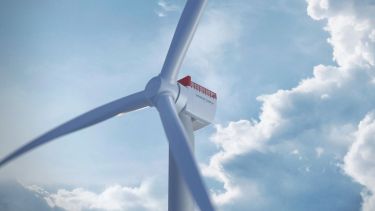Collaboration in action
Long term partnerships help deliver solutions for tomorrows industry. Learn more about the Sheffield Siemens-Gamesa Renewable Energy Research Centre.

A flagship collaboration between Siemens-Gamesa Renewable Energy (SGRE) and the University of Sheffield has brought down the levelized cost of energy from offshore wind, paving the way for the first zero-subsidy offshore windfarm and heralding an unprecedented boom in global offshore wind capacity.
The S2GRE centre has been a cornerstones of the groundbreaking strategic partnership between the University of Sheffield and Siemens that culminated in Sheffield’s selection as one of the global technology giant’s top tier innovation partners in July 2022. When it was founded in 2009, the Centre was one of the first collaborations to see a Siemens team embedded within a University. The centre has since grown to house all of SGRE’s consolidated motor/generator research, covering magnet shaping and skewing, turbine and generator control, topology, material content and torque optimisation.
The centre allows the University’s Electrical Machines and Drives Group to work closely with Siemens staff to identify and resolve key research challenges and advance the cutting edge of windpower technology. This work has underpinned the development of five successive models of novel permanent magnet direct drive (PMDD) generators for offshore wind turbines.
Sheffield’s excellence in modelling and simulation techniques has had a significant impact on SGRE’s strategy and innovation capacity, enabling it to reduce risk and increase ambition in designing new technologies by allowing every aspect of discoveries to be tested and validated in vitro before being developed for application. This has enabled SGRE to develop more speculative concepts, increase “right-first-time” designs and bring products to market faster. The end result has been a greater step-change in capability between each new model of turbine and an evidence-based reputation for technological innovation that has kept SGRE at the forefront of mature and emerging offshore wind generation markets.
The impact of the Centre’s research on the market itself has been phenomenal. It underpinned an increase of 70% in turbine output from 6MW to 11MW from 2009 to 2019, reducing installed cost per megawatt from £157 to £39. These improvements in cost and output made possible the world’s first zero subsidy offshore wind farm (the Hollandse Kust Zuid project in the Netherlands) in 2019. Over the last 12 months, the global offshore pipeline has experienced a ‘staggering’ boom in capacity, according to a recent report from Renewables UK . The organisation’s CEO cites the “urgent need to ramp up the transition to clean power - not only to tackle climate change, but also to provide secure supplies of low-cost homegrown electricity for people hit hard by international gas prices going through the roof” as well as “the benefits of creating millions of skilled jobs and attracting billions in private investment” as key drivers in this explosive growth.
Sheffield is proud of its contribution to the development of such a crucial future technology. It is currently co-leading (with SGRE) a £7.6m EPSRC Prosperity Partnership in Offshore Wind. The five-year research programme, aimed at improving the productivity of manufacturing and developing new drive train technologies for bigger wind turbines, connects the drives and motors work at the S2GRE Centre with a separate strand of research around the structural health monitoring of wind turbines that was already the subject of a collaboration between Siemens and Sheffield’s Dynamics Research Group (DRG). The programme concludes in 2022 and is expected to drive innovation in the offshore wind sector over the coming decade.

